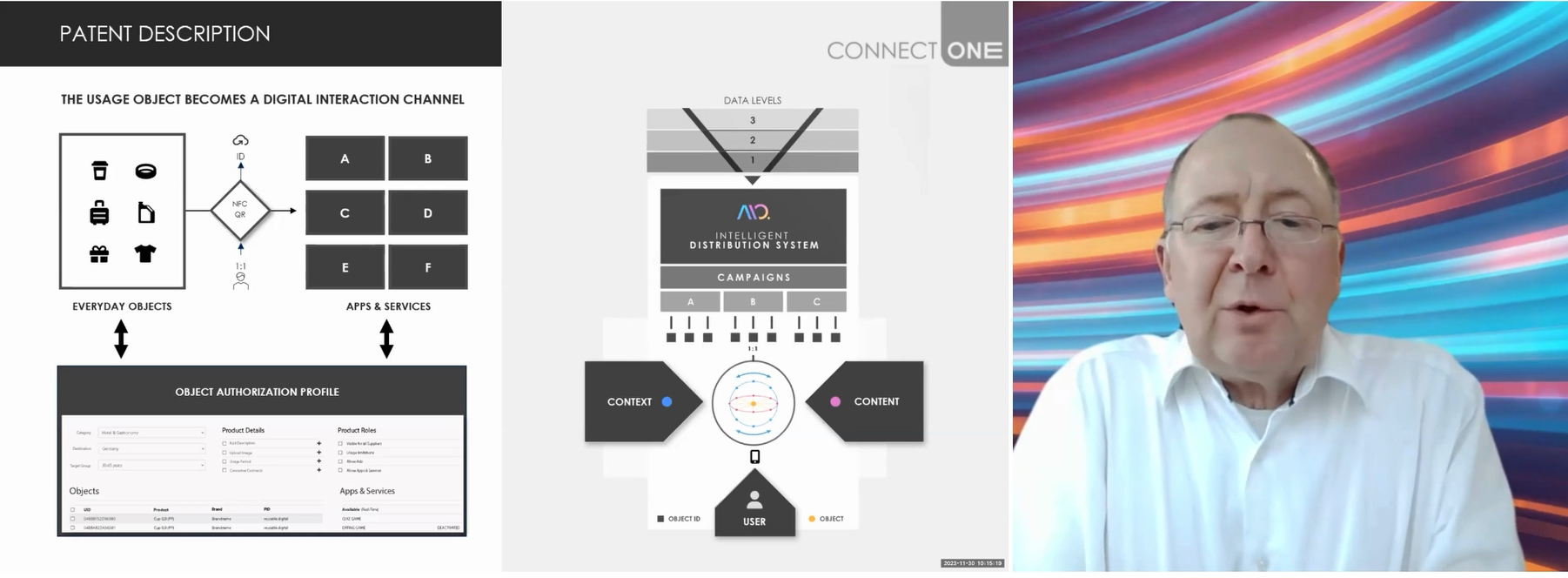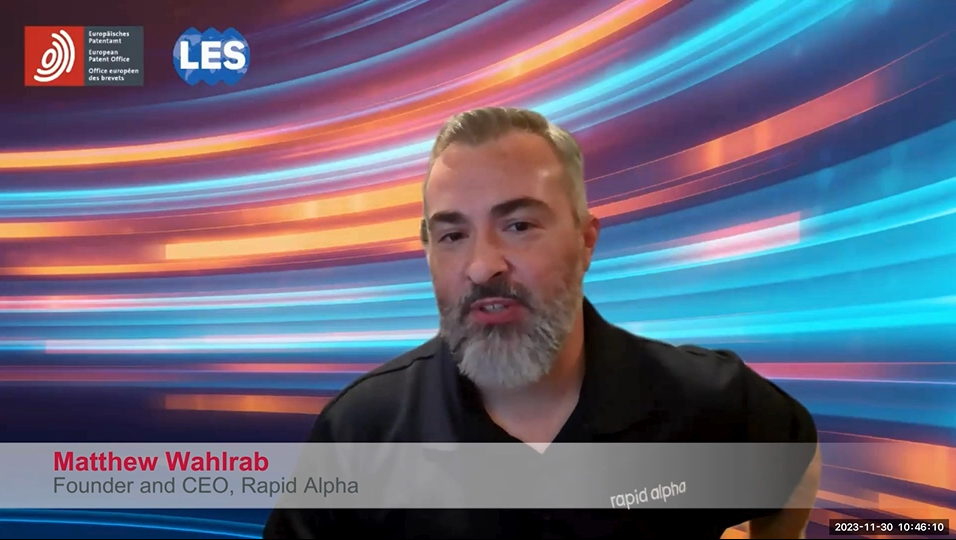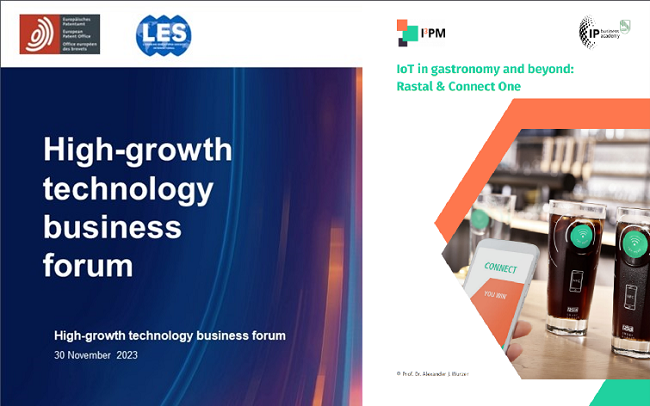Follow-up: HTB forum IP strategy and management
The HTB Forum, organized by the EPO, is a yearly event series to raise awareness among business decision makers about the relevance and chances of IP and IP management. The first two installments in 2023 were the Growth financing forum and the Build-to-sell forum and the series was concluded on 30.11.2023 with the IP strategy and management forum and a presentation of the case study Connect One by Thomas Nieraad.
Case study presentation
 Thomas Nieraad, is a market-oriented, hands-on entrepreneur with extensive global experience who believes in close collaboration between market and technical functions. He co-founded Connect One Digital AG, a provider of Internet for Things product-based customer interactions.
Thomas Nieraad, is a market-oriented, hands-on entrepreneur with extensive global experience who believes in close collaboration between market and technical functions. He co-founded Connect One Digital AG, a provider of Internet for Things product-based customer interactions.
The case study focuses on the successful collaboration between Rastal, a renowned glassware manufacturer with over a century of tradition, and Connect One, a pioneer in digital solutions for the hospitality industry. This partnership represents an ideal synergy of tradition and innovation, combining Rastal’s expertise in crafting high-quality glassware with Connect One’s digital solutions to transform the hospitality and beverage industry through the Internet of Things (IoT).
Rastal, known for its commitment to quality and design, produces a diverse range of glassware, including exclusive brand glasses protected by intellectual property. Connect One specializes in developing digital technologies that enhance operational efficiency and customer experiences in the hospitality sector. Together, they aim to drive digital transformation and create novel opportunities for businesses.
A notable outcome of their collaboration is the Rastal Smartglasses, integrating digital ordering systems into glassware. This innovation enables customers to place orders directly through the glass, improving restaurant efficiency and enhancing the overall dining experience. Additionally, Connect One’s analytics tool provides restaurateurs with valuable insights into guest behavior, empowering them to make informed operational adjustments.
The partnership not only benefits customers by increasing operational efficiency and satisfaction but also sets a new standard for innovation in the industry. It exemplifies how traditional companies can expand their business models, leverage intellectual property, and enter new markets by collaborating with technology providers.
Ultimately, Rastal and Connect One showcase how the amalgamation of tradition and innovation can yield successful outcomes. Their collaboration serves as a compelling example of how businesses, through strategic partnerships and the incorporation of cutting-edge technologies, can thrive in a competitive landscape. The case study underscores the transformative potential of embracing digital solutions in traditional industries to create a win-win scenario for companies and their customers.

Panel discussion
After the presentation of the case study an expert panel headed by Prof. Dr. Alexander Wurzer, Director IP Management Education, CEIPI, discussed the findings of the case study as well as what business decision makers in Europe, North America, and Asia can learn from it. Also questions from the more than 300 live attendees were addressed.
The other members of the expert panel were:
Matthew Wahlrab, Founder and CEO, Rapid Alpha
 Matthew is the Founder and CEO of Rapid Alpha, a global Innovation Management Advisory. He has managed the patent prosecution, licensing, and business development of large patent portfolios for the $350MM invention investment fund ISF and aerospace pioneer Boeing. Matthew has extensive experience with IP valuations, licensing benchmarking, and IP investment fund modeling. Notable achievements included the fund modeling for life science fund GreySky Venture Partners and cutting-edge technology fund the Deep Science Fund.
Matthew is the Founder and CEO of Rapid Alpha, a global Innovation Management Advisory. He has managed the patent prosecution, licensing, and business development of large patent portfolios for the $350MM invention investment fund ISF and aerospace pioneer Boeing. Matthew has extensive experience with IP valuations, licensing benchmarking, and IP investment fund modeling. Notable achievements included the fund modeling for life science fund GreySky Venture Partners and cutting-edge technology fund the Deep Science Fund.
He has helped his clients secure hundreds of millions in investment capital. He has supported or personally closed patent transactions that have earned over $120 MM in combined licensing revenues and sold over 4,400 patents. He has expertise in M&A, government contracts, joint ventures, and technology transfer. Matthew is recognized as one of the top 300 patent strategists in the world, as recognized by IAM with their IAM Strategy 300 Award for the seventh time in 2023 and recognition as a Global Strategy Leader in both 2022 and 2023.
He is an author of Keiretsu Capital’s Exit Strategy Handbook, a contributor to the 2021 ICC Intellectual Property Roadmap update, an IP fund formation advisor, and a Venture Partner for Boutique Venture Partners. Matthew is also a Chair for the I3PM Committee on Risk and a trainer for the European Patent Office’s University Certificates Initiative.

Wanxing Eugene Ho, Research and IP Director Mengniu Dairy
 Being the Research and IP Director for Mengniu Dairy, one of the world’s leading Dairy brands, Dr Eugene Ho empowers the company with IP strategy and patent intelligence. He supports inhouse research innovations, IP management, investments, M&A and IP commercialisation initiatives of Mengniu Dairy with vital IP and patent insights. With his biomedical, IP and VC experiences, he further catalyses the scouting of innovations and startups into Mengniu’s ecosystem.
Being the Research and IP Director for Mengniu Dairy, one of the world’s leading Dairy brands, Dr Eugene Ho empowers the company with IP strategy and patent intelligence. He supports inhouse research innovations, IP management, investments, M&A and IP commercialisation initiatives of Mengniu Dairy with vital IP and patent insights. With his biomedical, IP and VC experiences, he further catalyses the scouting of innovations and startups into Mengniu’s ecosystem.
He is also an adjunct IP lecturer at the National University of Singapore, where he teaches graduate students on topics related to IP, patents, entrepreneurship and venture capital. Formerly, Dr Eugene Ho was the Market Analytics and IP lead at a Southeast Asia- and Japan- based VC firm, where he scouted for promising industries and startups for investments via a combination of market and patent analytics and utilizes his IP expertise to help startups build their IP portfolios strategically.

The key learnings of the event
- Patents can not only be used to exclude, but through partnerships and cooperations between companies, new business areas and business models can be developed based on IP, which can generate new added value.
- It is vital for digital companies and startups to think about generating patent portfolios that meet the requirements of digitally transformed products and an IP management that meets the new requirements of digital businesses.
- It is important that the IP portfolio fits the company’s goals so that it remains competitive in the home market and can enter new attractive markets, e.g. in Asia and the USA.
- An IP strategy is about determining the IP needs derived from the IP position aiming for reaching the chosen business goals.



